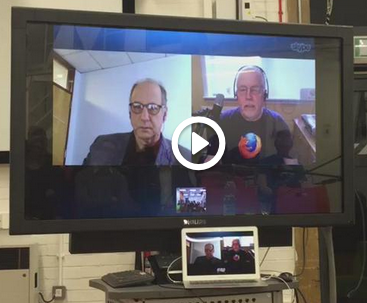 Yesterday @davidweinberger and I were guests on screen at a @commongroundmcr session in Manchester, hosted by Julian Tait (@Julianlstar) and Ian Forrester (@cubicgarden). We talked for a long time about a lot of stuff (here’s a #cmngrnd search featuring some of it); but what seems to have struck the Chord of Controversy was something I blabbed: “Tracking-based advertising is creepy and wrong… and needs to be wiped out.” Martin Bryant (@MartinSFP) tweeted a video clip and a series of other tweets followed. Here’s a copy/paste, which loses a little between Twitter and WordPress):
Yesterday @davidweinberger and I were guests on screen at a @commongroundmcr session in Manchester, hosted by Julian Tait (@Julianlstar) and Ian Forrester (@cubicgarden). We talked for a long time about a lot of stuff (here’s a #cmngrnd search featuring some of it); but what seems to have struck the Chord of Controversy was something I blabbed: “Tracking-based advertising is creepy and wrong… and needs to be wiped out.” Martin Bryant (@MartinSFP) tweeted a video clip and a series of other tweets followed. Here’s a copy/paste, which loses a little between Twitter and WordPress):
-
Adam Morgan and Martin Bryant favorited a Tweet you were mentioned in Feb 17: @MartinSFP @dsearls People dont realise how much worse our experiences with ads would be if they werent personalised
-
Feb 17: @cyrusradfar @dsearls I prefer personalised advertising, and working for a media startu, it’s better for us. But still, many find it creepy
-
Cyrus Radfar @cyrusradfar @MartinSFP @dsearls targeted ads allow new players to enter the market. W/o it, it’s cost-prohibitive and incumbents can only play.
-
Feb 17: @MartinSFP @dsearls People dont realise how much worse our experiences with ads would be if they werent personalised
-
Stephen @firstconversion @MartinSFP @dsearls People dont realise how much worse our experiences with ads would be if they werent personalised
-
Feb 17: Tracking-based advertising is “creepy and wrong… and needs to be wiped out,” says @dsearls #cmngrnd pic.twitter.com/yzUzDmtK80
-
Feb 17: Tracking-based advertising is “creepy and wrong… and needs to be wiped out,” says @dsearls #cmngrnd pic.twitter.com/yzUzDmtK80
-
Martin Bryant @MartinSFP Manchester, England @cyrusradfar @dsearls I prefer personalised advertising, and working for a media startu, it’s better for us. But still, many find it creepy
-
Cyrus Radfar @cyrusradfar @MartinSFP I’d like to debate @dsearls on this topic. I’ll take the side of the advertiser.
-
So, while Cyrus awaits his copy of the book, I thought I’d share a few links on the topic, before I hit the sack, jet-lagged, here in London.
First, a search for my name and advertising. Among those the one that might say the most (in the fewest words) is this post at Wharton’s Future of Advertising site.
Second, dig pretty much everything that Don Marti has been writing about business, starting with Targeted Advertising Considered Harmful. My case — the one people who like personalized advertising might want to argue with — is Don’s. He became my thought leader on the subject back when he was helping me with research for The Intention Economy, and he’s been adding value to his own insights steadily in the years since. (BTW, I’m not a stranger to the business, having been a founder and creative director for Hodskins Simone & Searls, one of Silicon Valley’s leading ad agencies back in the last millennium.)
When I get a chance I’ll write more on the topic, but for now I need some sleep.,

Leave a Reply